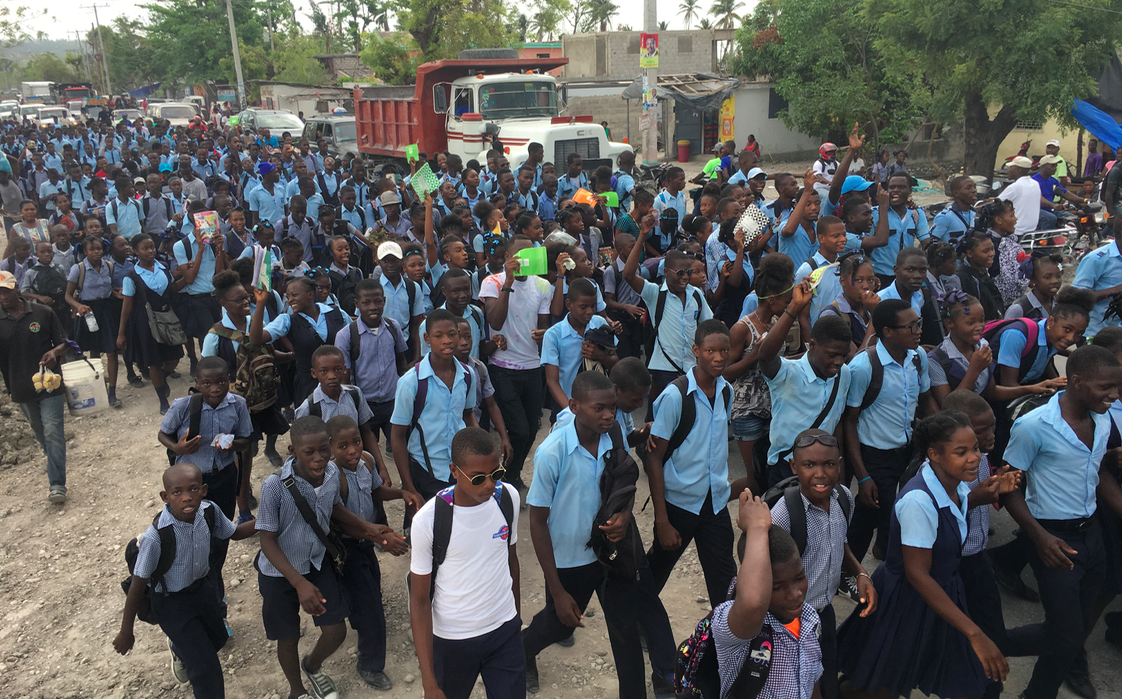Reportage
Hurricane-ravaged Haiti heads to the polls Sunday
In the week before a major election, Haitians are still digging out of the rubble of Hurricane Matthew.

In the best of times, Haitians battle chronic hunger, disease, joblessness and insecurity. When Hurricane Matthew ravaged the southwestern region Oct. 4, the fragile balance gave way to desperate chaos, with mass homelessness, a cholera outbreak and food shortages straining meagre government resources and overwhelming humanitarian organizations.
In remote villages throughout the region, the message is the same: No one is helping us, and the government doesn’t care.
In this context, voters will choose their next president Sunday in an election many fear could end in violence or the same kinds of fraud allegations that nullified the results of an October 2015 poll. Dozens of polling places are being used as temporary shelters for people displaced by the hurricane. And already there are allegations of officials distributing humanitarian aid on the basis of political loyalty.
West of Les Cayes, the region’s largest city, I spoke with an elderly couple in their home on a mountain ridge. The hurricane had reduced their concrete walls to a pile of stone, and one of their sons had patched up the opening with sheet metal. With their fruit trees destroyed and livestock killed by debris, they were living on white rice and gravy donated by family members in Les Cayes. Joseph Bazile, a wiry grandfather of 73 years, said someone passed out buckets of rice and water in a nearby town, but it wasn’t enough for everyone and no one had alerted them.
“We’re in God’s hands,” Bazile said.
Mounting pressure
Hurricane Matthew killed more than 1,000 people and, according to the U.N. humanitarian affairs office, left 175,000 homeless. The government responded to the vast need for shelter by converting more than 300 buildings into temporary dwellings, including 86 schools.
One of these is the Claudy Museau School on the outskirts of Les Cayes, where 183 families sleep on tattered wool blankets in crowded classrooms with no privacy.
“The government doesn’t care about us,” said Dunel Fontaine, 37, who grew up in Roche-à-Bateau and was blinded by a fever at age 11. Like most of the others, he has nowhere else to go, and the school residents are refusing to leave until the government gives them money to repair their homes.
Meanwhile, thousands of students have missed nearly two months of class. On Monday, the class president led a march of more than 200 students wearing blue school uniforms chanting “We need our school!” On Tuesday and Wednesday, they turned to civil disobedience, with hundreds of children laying on the pavement and blocking traffic for hours on the main highway connecting the southern peninsula.
Local governments have been slowly negotiating the evacuation of the schools, many of which will be used as polling places. But tensions remain high, with hunger sometimes giving way to violence. Armed guards accompany food trucks, and on Nov. 1, a teenager was shot and killed by police in Les Cayes during aid distribution. To the north, late last week, two people were allegedly decapitated when they rushed a charity helicopter.
U.S. ‘taking note’
Haiti has been under an interim government since President Michel Martelly stepped down following the botched elections last year. The United States, which picked up the tab for the first elections, refused to pay for another round.
In a statement Wednesday, the U.S. Embassy in Port-au-Prince said it was concerned about “inflammatory rhetoric and incidents of violence that have occurred during the campaign. … The United States is taking note of parties involved in electoral violence.” Haitian national police and U.N. peacekeepers are on alert for unrest this weekend.
In the final days of the race, more campaign events filled the streets, as trucks with loudspeakers urged voters to the polls. Opinion surveys have been inconclusive about which of the 27 candidates might win, though a runoff election appears likely. Only six candidates are actively campaigning.
At least one poll suggests the nominee for Martelly’s center-right Tèt Kale Party (which means “bald head” in creole) may be the frontrunner. Known as Neg Bannan Nan (“banana man”) for his banana farming empire, Jovenel Moise’s supporters lionize him for the same reasons they respect Donald Trump: They see his entrepreneurial success and lack of government experience as virtues.
Like all the candidates, Jude Celestin, an engineer who headed Haiti’s infrastructure agency, has promised to increase employment, and he has the backing of ex-President René Préval. He captures a great deal of anti-American sentiment in Haiti because of then-Secretary of State Hillary Clinton’s intervention that blocked his possible presidency in 2010.
Another competitor is Maryse Narcisse, a physician who headed the Health Ministry under left-wing President Jean-Bertrand Aristide in the 1990s. Her candidacy is an opportunity for Aristide, a liberation theologist, and his Fanmi Lavalas party to return to power with its anti-austerity, pro-equality platform.
The national election agency says it will take at least a week to tally the votes and announce the result.
Originally published at on
